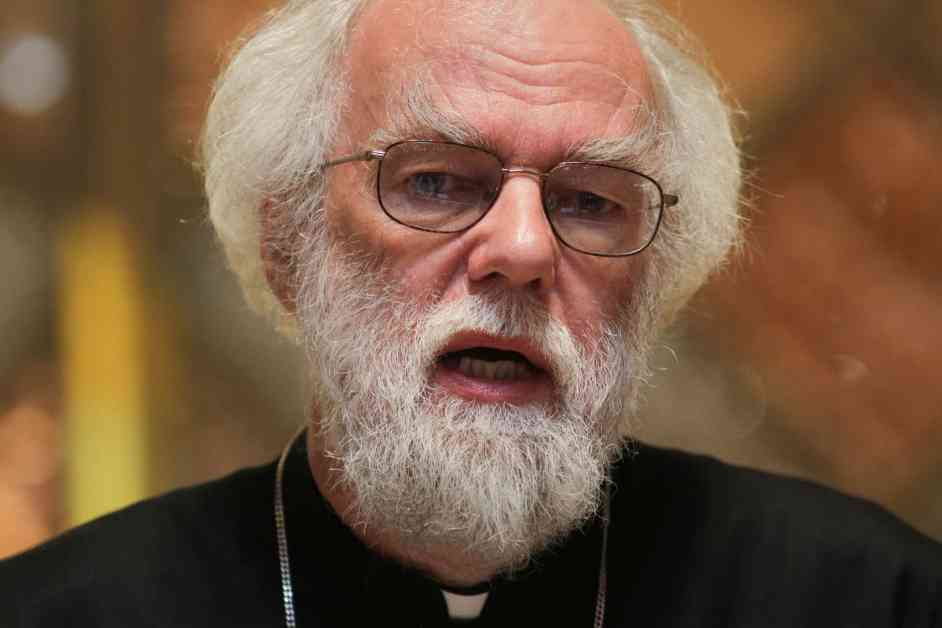**The Challenge of Representing Christians in the Liberal Democrats: A Former Archbishop’s Concern**
Former Archbishop of Canterbury Rowan Williams has raised concerns about the ability of Christians and individuals with strong religious beliefs to represent the Liberal Democrats. This issue arose after the party appeared to reject two prominent figures in its history, Charles Kennedy and Baroness Shirley Williams, who were known for their Christian beliefs and conservative views on issues such as abortion.
**Controversy Over Deselection Based on Christian Beliefs**
The controversy began with the deselection of former BBC journalist David Campanale over his traditional Christian beliefs. Campanale claimed that a local councillor, Luke Taylor, had forced him out of the party, stating that his Christian beliefs were incompatible with the Liberal Democrats. When Campanale pointed out that both Charles Kennedy and Baroness Shirley Williams were also Christians with similar conservative views on issues like abortion, Taylor reportedly responded by saying that the party of Williams and Kennedy was “over.”
The party’s legal defence document acknowledged Taylor’s statement, indicating that the party’s current policy platforms and public political stance no longer aligned with the beliefs of past prominent Liberal Democrats with Christian views. This decision has caused divisions within the party, particularly among MPs who are practicing Christians, including leader Sir Ed Davey, who had previously pledged to respect Christian beliefs within the party.
**The Legacy of Charles Kennedy and Baroness Shirley Williams**
Charles Kennedy and Baroness Shirley Williams were instrumental in the formation of the Liberal Democrats after the merger of the SDP and Liberal Party in 1988. Both figures, who had previously been members of the Labour Party, played a significant role in shaping the party’s values and principles. Their Christian beliefs and conservative views on certain issues were part of their identity and contributed to the party’s founding principles.
The party’s decision to distance itself from individuals like Kennedy and Williams has raised questions about the inclusivity of the Liberal Democrats and their willingness to embrace diversity of thought within the party. The rejection of candidates based on their religious beliefs has led to concerns about the party’s commitment to upholding democratic values and respecting individual conscience.
**Rowan Williams’ Reflection on Political Representation**
Former Archbishop of Canterbury Rowan Williams has weighed in on the controversy, questioning whether it is now impossible for individuals with certain moral views to represent a political party, even if they are willing to abide by the party’s discipline and democratic decisions. Williams highlighted the importance of allowing for dissenting views within a political party and expressed concern about the implications of demanding total agreement on certain issues.
Williams raised the issue of whether Orthodox Jews, Muslims, Catholics, and other Christians would also be excluded from representing the Liberal Democrats if the party continues to prioritize conformity over diversity of thought. He emphasized the need for clarity from the party leadership on their stance regarding individuals with dissenting views and the importance of respecting conscientious reservations within the party.
**Challenges Facing Christians in Political Representation**
The case of David Campanale and the broader implications for Christians in the Liberal Democrats reflect a larger debate about the role of religion in politics and the challenges faced by individuals with strong religious beliefs in representing political parties. The tension between personal convictions and party loyalty raises questions about the extent to which individuals can express their beliefs within a party framework.
The issue of abortion, in particular, has been a point of contention for many Christians within the Liberal Democrats, as the party’s stance on social issues may conflict with their religious beliefs. The demand for conformity within the party on certain issues has created a barrier for individuals with dissenting views, leading to concerns about the party’s commitment to diversity of thought and inclusivity.
**The Need for Clarity and Respect for Diversity**
In light of the controversy surrounding the deselection of candidates based on their Christian beliefs, there is a growing call for clarity from the Liberal Democrats on their approach to diversity of thought and respect for individual conscience. The party’s decision to dismiss individuals with dissenting views has raised questions about the inclusivity of the party and its willingness to embrace a range of perspectives within its ranks.
Moving forward, it will be essential for the Liberal Democrats to address the concerns raised by individuals like Rowan Williams and David Campanale regarding the representation of Christians within the party. By fostering a culture of respect for diversity and inclusivity, the party can ensure that individuals with differing beliefs feel valued and welcomed within the party.
By engaging in open dialogue and upholding democratic principles, the Liberal Democrats can navigate the challenges of representing individuals with strong religious beliefs while maintaining a commitment to inclusivity and diversity within the party. The legacy of figures like Charles Kennedy and Baroness Shirley Williams serves as a reminder of the importance of embracing a range of perspectives and upholding the values of tolerance and respect within the political sphere.












